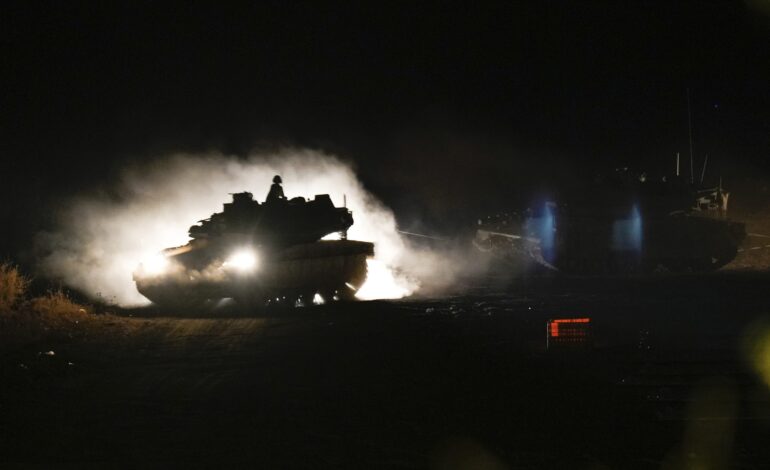Lebanon frontline and Israeli setbacks:
Over a month into Israel’s comprehensive and vicious military campaign against Lebanon, the Israeli army struggles to accomplish any significant gains along the northern border. Hezbollah forces, meanwhile, are not only repelling ground incursions but also intensifying their missile and drone attacks on northern Israeli towns, reaching major urban areas like Tel Aviv. This campaign supports the besieged Gaza Strip while defending Lebanese territories, with Israel’s attacks extending deeply into Lebanese areas like South Beirut. Notably, Israeli forces have escalated airstrikes on Hezbollah strongholds, yet resistance forces remain resilient, successfully countering incursions and targeting strategic locations, including Israeli Prime Minister Netanyahu’s residence in Caesarea.
Israel’s attempts to exploit previous strikes, including the September assassinations of Hezbollah leaders like Secretary General Sayyed Hassan Nasrallah and his successor candidate Sayyed Hashem Safieddine, have faltered as Hezbollah quickly regrouped, regained its command and control and resumed offensive measures. Utilizing longer-range and more sophisticated rockets, Hezbollah’s recent strikes have challenged Israel’s Iron Dome and other defense systems, leading to disruptions, including the repeated closure of the Ben Gurion Airport.
Gaza: Intensified assaults and the “Generals’ Plan”:
Simultaneously, Gaza faces escalating violence as Israeli forces pursue the “Generals’ Plan”, which aims to depopulate northern Gaza as part of a broader plan of territorial control. Northern areas, especially densely populated zones like the Jabalia camp, are facing daily bombardments, mass evacuations and blocked supply routes, effectively enforcing a total siege. Israeli occupation forces reportedly offer residents grim options — evacuation under threat, starvation or imprisonment — leading to severe humanitarian conditions. Medical services are further strained as five hospitals have been either destroyed or rendered inoperative by Israeli airstrikes.
Amid the deteriorating situation, Palestinian resistance forces continue counterattacks, utilizing ambush tactics and repurposing unexploded Israeli munitions. Israel, despite its aggressive strategy, acknowledges the toll on its military personnel, with reported casualties numbering 890 military and police since the onset of Operation “Al-Aqsa Flood.”
Regional escalations and international involvement:
As Gaza and Lebanon bear the brunt of the conflict, diplomatic initiatives have made limited headway. The U.S. and U.K., backing Israel, recently expanded their involvement, launching airstrikes on the Houthi-led government in Yemen in response to rocket and drone support for Gaza and Lebanon. American and British jets targeted Al Hudaydah and other Yemeni provinces, underscoring the conflict’s widening regional footprint. In Yemen, Ansar Allah group leader Abdul-Malik al-Houthi vowed ongoing support for Gaza, dismissing pressure from U.S., Israeli and British forces.
Meanwhile, Iraqi resistance has escalated its support for Gaza and Lebanon, increasing drone strikes inside Israeli territories. This uptick in Iraqi and Yemeni intervention, alongside resistance operations from Lebanon, has kept major Israeli cities like Tel Aviv under frequent air-raid alarms, complicating daily life and undermining Israel’s confidence in its air defenses.
Diplomatic maneuvers and Lebanon’s position:
Internationally, diplomatic momentum to halt hostilities remains stalled. The U.S. envoy Amos Hochstein’s visit to Lebanon included attempts to secure Lebanese cooperation on a ceasefire, conditional on Lebanon’s acceptance of Israel’s terms, including internal political changes. Lebanese leaders, however, have resisted such pressures, with Parliament Speaker Nabih Berri urging full application of U.N. Resolution 1701, which mandates Israeli withdrawal from Lebanese territories.
A humanitarian aid conference held in Paris, co-organized by France and the United Nations, raised funds to assist Lebanon’s 1.4 million displaced residents. Lebanon requested $1.16 billion to support urgent relief needs, particularly as winter approaches. In response, Israeli Prime Minister Netanyahu voiced disapproval of international support for Lebanon, claiming Hezbollah intends to infiltrate Israel via elaborate tunnels and armed vehicles.
Iran on alert for potential escalations:
Heightened tensions continue with Iran, which remains prepared for any attacks from Israel. Recent intelligence leaks have delayed Israel’s anticipated strike on Iran, though movement among Israeli forces and discussions with its “Five Eyes” allies—the U.S., U.K., Canada, New Zealand, and Australia — indicate preparations are ongoing. Iran’s leadership has issued repeated statements affirming readiness to respond to any Israeli aggression, with strong measures if Israeli attacks impact Iran’s nuclear, energy infrastructure, or high-ranking officials.
Gaza ceasefire talks amid escalating crisis:
On the diplomatic front, CIA Director William Burns and Mossad Chief David Barnea have traveled to Doha to negotiate with Qatari and Egyptian mediators for a potential ceasefire in Gaza, as well as a prisoner exchange agreement. Hamas, meeting separately with Egyptian officials, continues to advocate for immediate ceasefire terms, cessation of hostilities and prisoner swaps involving both Israeli captives and Palestinian detainees.
Amid these developments, families of Israeli captives have pressured Prime Minister Netanyahu to grant negotiation teams full authority for a swift resolution, particularly as humanitarian conditions worsen in Gaza. With diplomatic channels strained, the situation remains fragile, as resistance groups bolster defenses and international actors scramble for influence across the region.






Leave a Reply